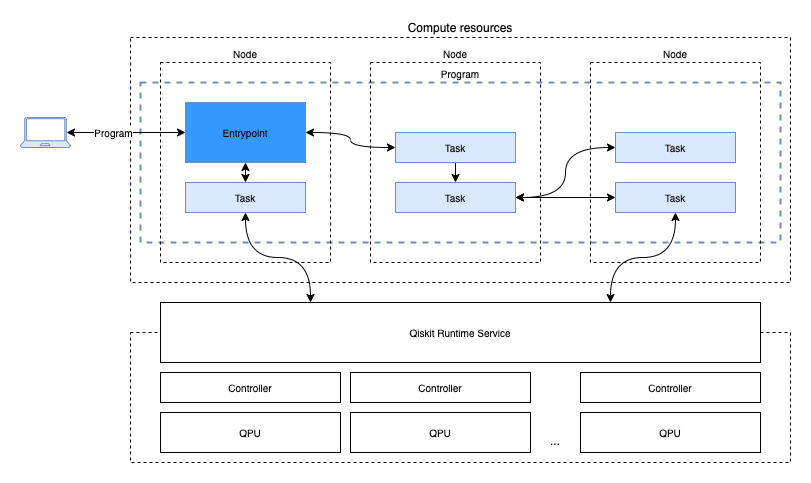- Installation
- Quickstart
- Beginners Guide
- Modules:
- Tutorials
- Guides
- How to Give Feedback
- Contribution Guidelines
- References and Acknowledgements
- License
Steps
- prepare infrastructure
- write your program
- run program
In the root folder of this project you can find docker-compose.yml
file, which is configured to run all necessary services for quickstart tutorials.
Run in a root folder
docker-compose pull
docker-compose up📝 For more advanced ways to deploy the project you have the guide: Multi cloud deployment.
Create python file with necessary code. Let's call in program.py
# program.py
from qiskit import QuantumCircuit
from qiskit.circuit.random import random_circuit
from qiskit.quantum_info import SparsePauliOp
from qiskit.primitives import Estimator
from quantum_serverless import QuantumServerless, run_qiskit_remote, get, put
from quantum_serverless.core.state import RedisStateHandler
# 1. let's annotate out function to convert it
# to function that can be executed remotely
# using `run_qiskit_remote` decorator
@run_qiskit_remote()
def my_function(circuit: QuantumCircuit, obs: SparsePauliOp):
return Estimator().run([circuit], [obs]).result().values
# 2. Next let's create out serverless object to control
# where our remote function will be executed
serverless = QuantumServerless()
# 2.1 (Optional) state handler to write/read results in/out of job
state_handler = RedisStateHandler("redis", 6379)
circuits = [random_circuit(2, 2) for _ in range(3)]
# 3. create serverless context
with serverless:
# 4. let's put some shared objects into remote storage that will be shared among all executions
obs_ref = put(SparsePauliOp(["ZZ"]))
# 4. run our function and get back reference to it
# as now our function it remote one
function_reference = my_function(circuits[0], obs_ref)
# 4.1 or we can run N of them in parallel (for all circuits)
function_references = [my_function(circ, obs_ref) for circ in circuits]
# 5. to get results back from reference
# we need to call `get` on function reference
single_result = get(function_reference)
parallel_result = get(function_references)
print("Single execution:", single_result)
print("N parallel executions:", parallel_result)
# 5.1 (Optional) write results to state.
state_handler.set("result", {
"status": "ok",
"single": single_result.tolist(),
"parallel_result": [entry.tolist() for entry in parallel_result]
})Let's run our program now
from quantum_serverless import QuantumServerless, Program
from quantum_serverless.core.state import RedisStateHandler
serverless = QuantumServerless({
"providers": [{
"name": "docker-compose",
"compute_resource": {
"name": "docker-compose",
"host": "localhost", # using our docker-compose infrastructure
}
}]
})
serverless.set_provider("docker-compose") # set provider as docker-compose
state_handler = RedisStateHandler("localhost", 6379)
# create out program
program = Program(
name="my_program",
entrypoint="program.py" # set entrypoint as our program.py file
)
job = serverless.run_program(program)
job.status()
# <JobStatus.SUCCEEDED: 'SUCCEEDED'>
job.logs()
# Single execution: [1.]
# N parallel executions: [array([1.]), array([0.]), array([-0.28650496])]
state_handler.get("result") # (Optional) get written data
# {'status': 'ok',
# 'single': [1.0],
# 'parallel_result': [[1.0], [0.0], [-0.28650496]]}We encourage your feedback! You can share your thoughts with us by:
- Opening an issue in the repository
For information on how to contribute to this project, please take a look at our contribution guidelines.
This project is meant to evolve rapidly and, as such, do not follow Qiskit's deprecation policy. We may occasionally make breaking changes in order to improve the user experience. When possible, we will keep old interfaces and mark them as deprecated, as long as they can co-exist with the new ones. Each substantial improvement, breaking change, or deprecation will be documented in release notes.
[1] Qiskit Terra
https://github.com/Qiskit/qiskit-terra
[2] Client for IBM Qiskit Runtime
https://github.com/Qiskit/qiskit-ibm-runtime





